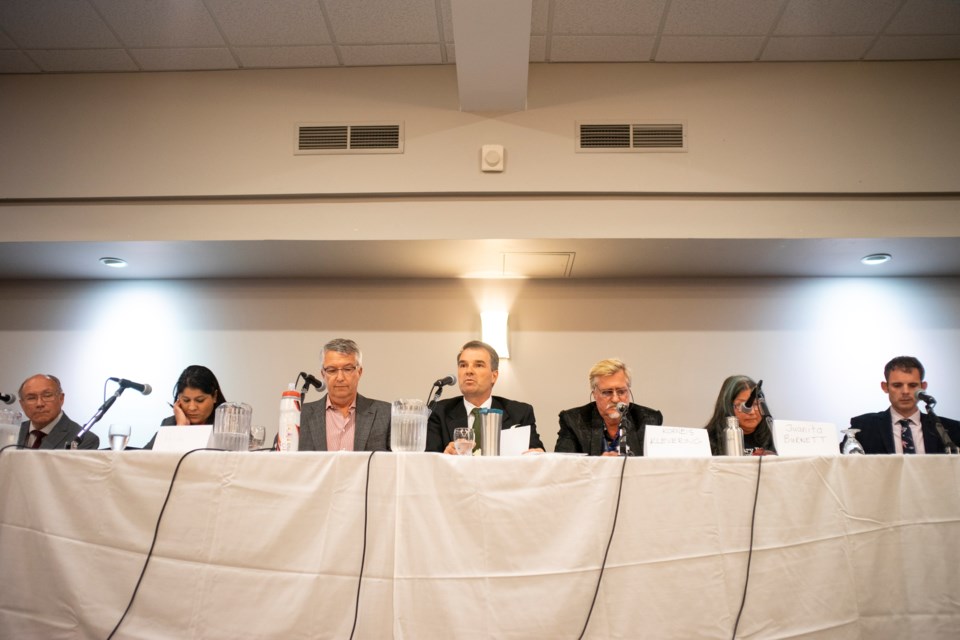Green Party candidate Steve Dyck took a swing and a miss against incumbent Lloyd Longfield's work as MP in front the estimated 400 people who attended Thursday’s all-candidates meeting on social justice issues.
During a question that gauged support from candidates about proportional representation, Dyck said he was disappointed by the lack of support from Longfield on the matter while he sat as Liberal MP for Guelph.
“I worked with a multi-party group to gather 3,800 signatures in support of proportional representation and I think it’s critical that we move our democracy forward away from toxic, pulverizing politics,” said Dyck. “I didn’t hear our member of parliament stand up in parliament and present our petition to parliament, speaking on behalf of proportional representation.”
As Dyck continued, Longfield piped up with some support from the audience, looking somewhat perplexed as he did so.
“I did,” said Longfield. “I did five times.”
A search of his remarks in parliament confirms Longfield did present local petitions in favour of electoral reform and proportional representation on a number of occasions.
The two-hour all candidates meeting was held Thursday at the Italian Canadian Club. In addition to Dyck and Longfield, the meeting also included: Aisha Jahangir for the NDP, Mark Paralovos for the People’s Party of Canada, Gordon Truscott for the Christian Heritage Party, Communist Party candidate Juanita Burnett and independent Kornelis Klevering.
Local Conservative candidate Ashish Sachan initially agreed to attend the meeting but later withdrew, the crowd was told.
The meeting was hosted by the Guelph Wellington Coalition for Social Justice, Wellington Water Watchers, the Retired Teachers of Ontario and OPIRG Guelph.
Questions revolved around common social justice issues, including: the opioid crisis, support for unions, housing, health care, climate concerns, First Nations issues and reformation of the voting system.
The record of the Liberal Party came up a number of times throughout the debate, with Longfield being challenged on the proportional representation issue, as well as the purchase of the Trans Mountain Pipeline and the pressuring of Jody Wilson-Raybould while she was held the position of attorney general.
Jahangir, who works as a mental health nurse at Hamilton-Wentworth Detention Centre, spoke confidently about health care and union issues but froze when asked about judicial reform, passing on the question entirely.
Much to the chagrin of many in the audience, Klevering referred to Indigenous people as 'Indians' twice during a question about their role in climate change.
Answering a question about what role Canada should play in terms of resettling refugees, Paralovos repeated People’s Party platform promise to reduce the number of immigrants and refugees entering the country.
“I think Canada does quite a lot, we take the highest number of refugees - I believe — in the world,” said Paralovos. “The People’s Party is the only party offering a reduction in this group of people and the associated, necessary savings that come with that.”
Truscott said he was part of a group of five men who sponsored a refugee family in the 1980s and that they new have a better house than he does. He said a five-year waiting period for some refugees waiting to come to Canada is unacceptable.
“I don’t have any problem with sharing Canada, we have a large country here,” said Truscott.
Jahangir said Canada must stand with refugees and promised an NDP government would suspend the Canada-U.S. Safe Third Country Agreement, a plan which received a big applause but also at least one jeer from the crowd.
“To recognize that children are being stripped away from heir parents, that they are put in cages, that they are not given medical services — Canada must stand up and do something,” said Jahangir.
Longfield lauded the efforts of Guelph’s Jim Estill in helping to settle Syrian refugees in the city. Longfield noted that about eight of 10 of those refugees are now employed.
“Guelph is in a unique position in Canada in terms of how we have stepped up for refugees,” said Longfield.
He noted bringing refugees to Guelph has really expanded our diversity but acknowledged it has also added pressures to housing, health care and education.
Dyck made a point to note he was part of a group that sponsored a refugee family, ‘before Jim Estill.’
“Our single mom and her three children — she has created a business here in Guelph that is thriving,” said Dyck. “We need to have more resources in our system to make sure we are responding ethically.”
“These people need our help,” he added.
Klevering said Canada should be prepared to receive hundreds of thousands or millions of refugees in the future.
“They can’t all come to Guelph,” he conceded.
Klevering said global warming will warm northern Ontario to a point where refugee colonies could be set up around James Bay.
In the final response to the question, Burnett said Canada needs to welcome immigrants and refugees.
“We need to end scapegoating and end deportations of immigrants and refugees,” said Burnett. “We need to provide a path to citizenship for foreign migrant workers in Canada.”
Canada will go to the polls on Oct. 21.



